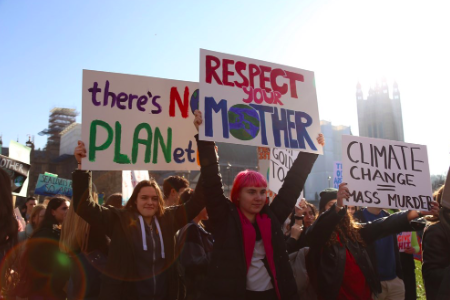Students take the lead in climate marches
All across Europe, teens are walking out of classrooms to demand action on climate change. The walk-outs, which are called “Youth Strike 4 Climate” as well as “Fridays for Future,” were founded by 16-year-old Greta Thunberg, from Sweden, who first began protesting outside the Swedish parliament last fall. “Youth Strike 4 Climate” is one of the largest global strike issues that this generation will face, considering the seen impact of climate change already. In recent months, this worldwide strike has spread across Europe to demand action to be taken regarding climate change. Students march in anger and disappointment as they chant “Save our planet!” and “What do we want? Climate justice. When do we want it? Now.” Students march to these chants on Parliament Square in London, as they refuse to skip class in hopes of gaining attention from political leaders.
Thunberg addresses the United Nations’ climate talks, declaring, “Our political leaders have failed us.” Students believe that even though they are unable to vote, they still have a right to be heard. For example, in Australia, 15,000 students were eager to march with passion and energy in Sydney’s Martin Place in Nov. 2018 after two 14-year-old girls wrote letters calling for greater action on climate change. While in Belgium, a student-led climate march started by Anuna De Wever and her best friend Kyra Gantois saw more than 35,000 people hit the streets across the country, as well as thousands of students taking the streets of the Hague, Netherlands, Belgium, and France.
Many people find it hard to imagine that the international protest movements, led by young teens with power, are the leaders of our generation. With the help and support from the parents and teachers who have also joined the marches, a new era of student engagement in climate activism has emerged. Organizers plan to build up “Fridays for Future” to collaborate on a global walk-out on Mar. 15 involving students from nearly 20 countries. After all, it is not only humans who are affected by climate change, but our earthly natural greenhouse gases are also changing. Over the last couple of centuries, the burning of fossil fuels like coal and oil has increased, making it the major contributor cause of climate change. With that being said, the consequences of the warming ocean water temperatures increasing in the ocean raise the frequency of coral reef bleaching. The marches reflect a sign of involvement and a call for public attention to raise awareness about the issues of the environment.
Xavier junior Angelina Abdeen believes that “climate change is a very important, very real issue, that we face today. We must learn about it so as to understand the steps we need to take in order to correct it. We only have about 12 years left before it’s irreversible!” Abdeen expresses that, “Yes! It’s especially important that younger people are concerned about climate change because ultimately, we are going to have to live with the consequences. In fact, the youth are actually doing a lot right now to raise awareness within society. One way is through the Youth Climate Strike, which is happening on a national scale. There’s one right here in Arizona, which is on Friday, March 15, 2019, at 4 PM – 6 PM at the Arizona State Capitol.”
As young leaders in the Xavier community, we should be deeply worried about the future of our planet and need to take strong action now. It is important to show the older generations, as well as the current generation, that teens can take matters into their own hands and use their time and energy to do good, for the betterment of our futures.




